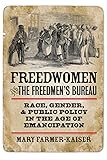Freedwomen and the Freedmen's Bureau : Race, Gender, and Public Policy in the Age of Emancipation / Mary J. Farmer-Kaiser.
Material type: TextSeries: Reconstructing AmericaPublisher: New York, NY : Fordham University Press, [2022]Copyright date: ©2010Description: 1 online resource (256 p.)Content type:
TextSeries: Reconstructing AmericaPublisher: New York, NY : Fordham University Press, [2022]Copyright date: ©2010Description: 1 online resource (256 p.)Content type: - 9780823232123
- 9780823291632
- online - DeGruyter
| Item type | Current library | Call number | URL | Status | Notes | Barcode | |
|---|---|---|---|---|---|---|---|
 eBook
eBook
|
Biblioteca "Angelicum" Pont. Univ. S.Tommaso d'Aquino Nuvola online | online - DeGruyter (Browse shelf(Opens below)) | Online access | Not for loan (Accesso limitato) | Accesso per gli utenti autorizzati / Access for authorized users | (dgr)9780823291632 |
Browsing Biblioteca "Angelicum" Pont. Univ. S.Tommaso d'Aquino shelves, Shelving location: Nuvola online Close shelf browser (Hides shelf browser)

|

|

|

|

|

|

|
||
| online - DeGruyter Freedom and Law : A Jewish-Christian Apologetics / | online - DeGruyter Freedom, Union, and Power : Lincoln and His Party in the Civil War / | online - DeGruyter Freedom's First Generation : Black Hampton, Virginia, 1861-1890 / | online - DeGruyter Freedwomen and the Freedmen's Bureau : Race, Gender, and Public Policy in the Age of Emancipation / | online - DeGruyter Freud and Fundamentalism : The Psychical Politics of Knowledge / | online - DeGruyter Friends on the Way : Jesuits Encounter Contemporary Judaism / | online - DeGruyter Futurity in Phenomenology : Promise and Method in Husserl, Levinas, and Derrida / |
Frontmatter -- Contents -- Abbreviations -- Acknowledgments -- Introduction: ‘‘a long time in want of a bureau’’ -- 1. ‘‘that the freed-women . . . may rise to the dignity and glory of true womanhood’’: The Men, Purpose, and Gendered Freedom of the Freedmen’s Bureau -- 2. ‘‘a weight of circumstances like millstones about their necks to drag and keep them down’’: Freedwomen, Federal Relief, and the Freedmen’s Bureau -- 3. ‘‘The women are the controlling spirits’’: Freedwomen, Free Labor, and the Freedmen’s Bureau -- 4. ‘‘to put forth almost superhuman efforts to regain their children’’: Freedwomen, Parental Rights, and the Freedmen’s Bureau -- 5. ‘‘strict justice for every man, woman, and child’’: Gender, Justice, and the Freedmen’s Bureau -- Conclusion: ‘‘the unpardonable sin’’ -- Notes -- Bibliography -- Index -- Reconstructing America Series
restricted access online access with authorization star
http://purl.org/coar/access_right/c_16ec
Established by congress in early 1865, the Bureau of Refugees, Freedmen, and Abandoned Lands—more commonly known as “the Freedmen’s Bureau”—assumed the Herculean task of overseeing the transition from slavery to freedom in the post–Civil War South. Although it was called the Freedmen’s Bureau, the agency profoundly affected African-American women. Until now remarkably little has been written about the relationship between black women and this federal government agency. As Mary Farmer-Kaiser clearly demonstrates in this revealing work, by failing to recognize freedwomen as active agents of change and overlooking the gendered assumptions at work in Bureau efforts, scholars have ultimately failed to understand fully the Bureau’s relationships with freedwomen, freedmen, and black communities in this pivotal era of American history.
Mode of access: Internet via World Wide Web.
In English.
Description based on online resource; title from PDF title page (publisher's Web site, viewed 03. Jan 2023)


